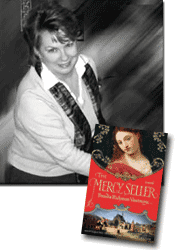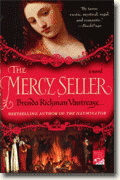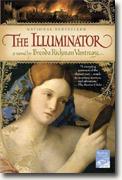author interview
book reviews:
· general fiction
· chick lit/romance
· sci-fi/fantasy
· graphic novels
· nonfiction
· audio books
· author interviews
· children's books @
curledupkids.com
· DVD reviews @
curledupdvd.com
newsletter
win books
buy online
links
home
for authors
& publishiss
for reviewers

|
|||||
 
Curledup.com contributor Luan Gaines interviewed Brenda Rickman Vantrease,
author of The Mercy Seller Interviewer Luan Gaines: What was your inspiration for The Mercy Seller Brenda Rickman Vantrease: Who can ever say really where inspiration comes from? My stock answer to this always—the history. For example, a discovery that the man who served as model for Shakespeare’s Falstaff actually died a Christian martyr intrigued me, appealed to my sense of irony. I started to dig a little deeper in the history and that sparked my imagination, bringing up other questions, other personalities. The late medieval and renaissance periods in English history are fertile ground for my imagination. Finn the Illuminator and his granddaughter, Anna Bookman, copy the Latin text of the Bible into a language common people can understand. Such remarkable talent is also featured in your previous novel, The Illuminator. Do you have a special interest in the practice of illumination and/or this historical period? I have been drawn to this historical period since early childhood when I first read tales of fair damsels and white knights. Of course with maturity came the realization that underneath that gauzy, romantic picture was a much uglier reality. As a young woman many years ago, I first saw the Book of Kells. I remember being struck by its beauty. Since then I’ve seen several manuscripts on display in museums. I suppose, when I was casting about for an occupation for my hero, that interest bubbled to the top. But no, I didn’t start out to write about an illuminator. The more I read about the development of books, the impact of books on language, religion, society—not to mention the art of illumination—the more intrigued I became. I had always thought all the manuscripts were illuminated in abbeys by monks. When I discovered that some were done by independent artists, well I was elated. I’d found an occupation for my hero.
That was a very dark time in Christian history. Because the Roman Church enjoyed complete and total power—even the king was under the power of the pope; a whole country could be cut off from communion if the king fell out with the Church—the institution became greedy and corrupt at the top where the power was concentrated. The threat of eternal damnation was very strong for the commoner whose miserable life here was often a kind of hell on earth. The threat of hell and the hope of heaven ruled both his dreams and his nightmares. The Church held the keys to both—not Christian belief, but the Church as political entity. Because the people could not read the Bible (the rulebook) for themselves, they were held in a sort of spiritual bondage. They were forced to live in superstitious fear of the devil and pay tithes (pence for penance) that they could not afford. Even the nobility lived under the threat of excommunication. To question the doctrine was to question the makers of the doctrine. With too much questioning, the whole power structure could topple like a house of cards.
Wycliffe has been rightfully called the morning star of the reformation. Without Wycliffe there would have been no Jan Hus and without Hus there would have been no Luther. Without the people’s ability to read the Bible for themselves in their own languages, there could have been no basis for refuting the many false and self-serving teachings of the medieval Church. Wycliffe’s teachings have spread to Prague, but so has the long arm of the Inquisition. What is the result of Anna’s fiancé, Martin’s, incautious flaunting of his heretical beliefs? Because of the strong nationalistic tendency of the Czech people, the Hus movement was allowed to go unchecked for a season. The king was encouraging the development of the Czech language. It might seem that it was Martin’s flamboyant zeal that brought the whole tolerant atmosphere to an end. But not really. If these three students, martyred at the beginning of The Mercy Seller Anna is a sympathetic character, her fiancé and grandfather dead, without resources and left to make her way to England for sanctuary. What would be the future of such a woman in the 15th century? Without some relative to take her in, she would just be another of the many beggars along the road. She would have gone from almshouse to almshouse, seeking shelter. The Church, for all its corruption, had a charity arm and encouraged hospitality among the nobility. Of course, given her religious upbringing and heretical ideas, she would not have long survived in such an atmosphere, unless she learned to mumble a few prayers in Latin and keep her heretical ideas to herself. She might have even wound up in one of the many brothels, as did Gabriel’s mother. The gypsies offer Anna temporary respite, but she is never truly welcome in the camp. Why are Anna and the child, Little Bek, outcasts in the gypsy camp? My research showed the Gypsies to be somewhat of a closed society, clannish and tribal, strongly family oriented. Such exclusiveness would prohibit their assimilating outsiders fully. The hysterical crowds shout, “Float the witch!” Why does this chant strike terror in Anna’s heart? “Floating the witch” was not an unusual custom of the late medieval and renaissance periods. It was a kind of trial by ordeal, the idea that if you bound a woman suspected of witchcraft and threw her in the water and she didn’t drown, she was guilty of witchcraft. So you hauled her out and burned her at the stake. If she drowned of course, she was innocent. Dead—but innocent. Although Anna might not have witnessed such an ordeal, she would surely have heard of it. Is Friar Gabriel content in his duties, selling penances to those who can pay? Why does Thomas Arundel, the Archbishop of Canterbury, choose this humble friar to uncover evidence of heresy against Sir John Oldcastle? And why in France? Gabriel, like most people trained from childhood by the Church, accepts the received wisdom. Only as he matures and his friar’s duty takes him out into the world, does his innate intelligence and humanity surface. The first scene that introduces him is intended to show his burgeoning dissatisfaction with his “chosen” path. The friars were not “humble.” We think of Friar Tuck of Robin Hood Legend and many of the parish priests who could scarcely read or write and knew little or no Latin, but the Order of Dominican Friars was actually an order of the best educated, brightest, and most articulate. They were chosen by the Church to go out and preach Church doctrine to the populace. They were also an ambitious Order. Father Francis, Gabriel’s mentor, would have spent a lifetime building up connections to showcase his son. But to Arundel he would have been expendable should he fall into danger in hostile France. France had the largest guild of scribes and illuminators in medieval Europe. In addition France had been perpetually at war with England and paid allegiance to the French pope in Avignon. (In the papal split within Europe, England stayed with the Italian pope.) France didn’t really care if heresy infected the English whom they considered followed a false pope anyway. It would have been natural to suspect this might be a source for Oldcastle—and having my two protagonists meet in France served my plot well. What is the cause of the long-standing enmity between Arundel and Oldcastle? How does Henry V’s friendship favor Sir John? Arundel is known in history as one of the most zealous of all heretic haters. Sir John’s heretical activities would have been enough to make him Arundel’s natural enemy. The fact that he was a nobleman with a connection to the king made him even more dangerous in Arundel’s eyes. As to the relationship between the king and Sir John, they were battlefield buddies from the French wars—not to mention alehouse buddies. They had many shared adventures and fond memories. Henry was reluctant to go after his old drinking buddy because of his affection for him. Disguised as an affluent merchant, Van Cleve, Friar Gabriel falls in love with Anna, anathema to a man of the cloth. In what way does his relationship with Anna throw Gabriel into a crisis of faith? At first, it is Gabriel’s physical attraction to Anna—he’s having trouble with the celibacy rule anyway—that waylays him. When he breaks his rule of celibacy for her, his bond with his Church is already compromised in his mind. In a way his disguise undoes him. As Van Cleve, emotions and thoughts slip in that he would have suppressed as Friar Gabriel. Once that transformation happens, once he falls for Anna completely, his split with the Church is inevitable. For even if Anna had not been a heretic, even if she had agreed with the secret relationship that so many clerics enjoyed, Gabriel was bound to break away sooner or later. The seeds were sown when he left the seclusion of the monastery for the road. The disillusionment he experienced with Father Francis was as much a catalyst as his love for Anna.
By handing over the evidence and then warning the abbess, Gabriel seeks to serve both his conscience and his church. But Gabriel, once he discovers Anna is the scribe against whom he is gathering evidence, can no longer enjoy such waffling. He must choose. Because of his evidence, Anna and the abbess fall into immediate danger of execution under the law. The information Gabriel gains from his mother about the great lie of his father’s life, marks the moment he turns his back on everything he thought he believed. Sir John Oldcastle is fearless in his belief in the rightness of his cause. Yet the Church’s power is fearsome as well. In what way does Sir John personify the changing attitudes about religion? How far will he go to defend his beliefs? Before Sir John Oldcastle took up the cause, the movement was largely being spread by a few rogue preachers, some scholars, and the great “unwashed masses.” These could be dealt with by a few burnings and a massacre or two such as the one following the Peasants’ Revolt. But once the new doctrine infected the nobility, well that marked a whole new threat for the Church. Even Sir John felt a false sense of security because of his relationship with the king. As to how far he will go? History shows how far he was willing to go—he was willing to commit treason against his king—and sometime friend—in the service of his belief that the Church had gone astray. Well he knew the consequences of such an action. He and Wycliffe and many of those early reformers—even Luther—did not start out to start a new faith or even a new church. They just wanted to protect the one they had from a regime they thought had become corrupt. What is the particular significance of Little Bek in The Mercy Seller Little Bek fills the same role as Magda in The Illuminator. They are marginalized, discarded by society, and yet uniquely and wonderfully gifted. Each is a means of grace: Magda saves the child at the end of The Illuminator, and Bek saves Anna with his music. When Anna admits to her forbidden translations when confronted in the abbey, she seals her fate as a heretic and is delivered to the Tower. If she were not pregnant, what would be Anna’s fate in the Tower? She would not be executed or physically tortured—as long as she was pregnant. If she were not pregnant, she would be at the mercy of Arundel, and Arundel doesn’t show much mercy. He probably would make an example of her with a public execution. Friar Gabriel is a conflicted man, his past encroaching on the present. How do the circumstances of his birth and adoption by his mentor determine the direction of Gabriel’s life? Gabriel was “called” to his vocation by his mentor and given an education by the church. Had he not been thus adopted, he would of course not have been educated. But I like to think he would have risen out of the gutter in which he’d been born, perhaps found a patron of the merchant class. At the end of The Mercy Seller Nowhere permanently. In Bohemia, the Hussite Wars are about to erupt in response to Hus’s martyrdom. Their safety would depend on their own discretion, their ability to stay outside the gaze of Church. It would be another hundred years before Luther brought the Reformation to the continent. As a writer, what authors have inspired your work? As a teacher and a lifelong student, I had to read and learned to love the nineteenth century novel: Dickens, the Bronte Sisters, Sir Walter Scott . . . I love the stories and characters of the Shakespeare tragedies and some of the histories. In my early years, I read a lot of Anya Seton—her Green Darkness is one of my all time favorites—Norah Lofts, and Rafael Sabatini. But I also read some fantasy: Watership Down—I am still in awe of that one—and some of Ray Bradbury’s science fiction. Daphne Dumaurier sparked my interest in the contemporary Gothic novel. Her Rebecca remains one of my favorites. Rutherford’s Sarum is another of my favorites and of course The Name of the Rose. I suppose all of these have influenced my writing in some way. They all have one thing in common—great storytelling. Are you working on a new novel? If so, can you share something about it with us? I’m very interested in the making of the English Bible. I want to write one more about that subject and then move onto something else. The influence of the printing press was phenomenal. It enabled William Tyndale to paper England with cheap copies of the Bible. So for the next one, I’m taking a leap forward in time to Tudor England. I am fascinated by the complex character of Sir Thomas More and his role in the reformation in England. Brenda Rickman Vantrease lives in Nashville, Tennessee. Her "outstanding debut," The Illuminator, was translated into fifteen languages and chosen as a Book Sense 2006-2007 Reading Group Pick. Contributing reviewer Luan Gaines interviewed Brenda Rickman Vantrease, author of The Mercy Seller (see accompanying review), about her book for curledup.com. Luan Gaines/2007.
|
|||||
| fiction · sf/f · comic books · nonfiction · audio newsletter · free book contest · buy books online review index · links · · authors & publishiss reviewers |
|
| site by ELBO Computing Resources, Inc. | |


